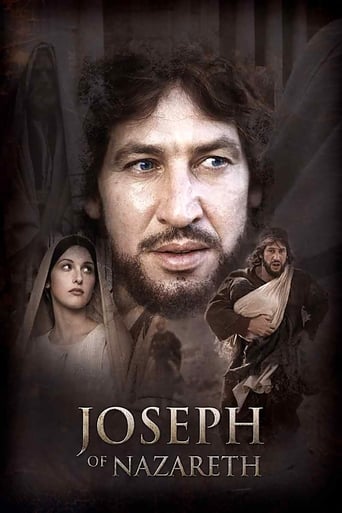Armand
portrait of an unknown. a silhouette in the Biblical story. sign of a miracle. nice figure in the Christmas atmosphere. but nothing else. this film is a real jewel for precise definition of Joseph figure. not a fantasy game but reconstruction. nothing heroic, pink or idealized. only story of a man in middle of not easy period. Joseph is a witness. master carpenter, good uncle for his nephews, honest believer, admirable friend. his life - fragile boat in political storms. his mission - to be support for others. and axis of a circle. so, Tobias Moretti performance is admirable for courage to give shining to each nuance of his role. a good work , not great - maybe - but real honest.this fact is important. because Joseph is more than a nice old man or prey of an extraordinary event. he is himself. image of good intentions and wise gestures, protector for his fiancé and level for Savior way. nothing heroic. only model for a decent existence.
John Nickolaus
Beyond the traditional Christmas story of the Nativity, next to nothing is known about Joseph, the Earthy father of Jesus and husband of Mary. After taking on the role of foster father to the Son of God, and the search for 12 year old Jesus in Jerusalem, Joseph of Nazareth just disappears from Biblical record. "Giuseppe di Nazareth" attempts to answer that question.Made in 1999 by Raffaele Mertes, "Giuseppe di Nazareth" is an honorable, yet weak offering from the Italian master of Biblical films. Responsible for the beautifully told "Maria Maddalena" (2000), Mertes does not fictionalize the story of Joseph as well as he does Magdalene's story. As with all Biblical tales, a certain amount of "filler" needs to be added when the Bible fails to give us the story, and "Giuseppe" is the result of weak storytelling. The plot just puts Joseph, and his family, in far too many unlikely situations, and the dignity of the characters suffer for it.As "Joseph", Tobias Moretti gives a fine performance. With large, expressive eyes, he manages to convey his sincerity in the role, with very little help from the script. On fine scene in particular is Joseph's advise to a nephew who's betrothed has been violated by Roman soldiers. Moretti's Joseph is truly a child of God and his character never waivers in his love of the Lord. It's a pity this performance went to waste in this film.Stefania Rivi, as "Mary", is a perfect example of "looks aren't everything". She is a very beautiful woman and makes a picture perfect "Virgin Mary", but is stiff and emotionless as an actress. Her earlier scenes are not bad, but after the "Nativity" she appears to simply go through the motions. I had hope for her portrayal of "The Mother of the Lord", but Rivi doesn't deliver. She also appears to be the only person in Israel that doesn't age. While Joseph, Anna (Mary;s mother) and Jesus all age 12 years by the end of the film, Mary remains looking a youthful 17! Is this an after affect of her holy encounter with God????The most annoying performance in the film, sadly comes from the 12 year old "Jesus" himself, Jurij Gentilini. This has to be the worst child actor I have seen in quite some time, and the fact that he is supposed to be playing the Son of God doesn't help the situation either. He shows even less emotion than the actress playing his mother (which is hard to think possible!), and literally seems to recite his lines. If I hadn't known the outcome of the situation, I would have been praying that Mary and Joseph would never find him again after they lose him in Jerusalem! God, please forgive me!!!!Thankfully, director Raffaele Mertes grew in his storytelling by the time he got to "Maria Maddalena" a year later.On an interesting side note, the white box that contains the frankincense give the Holy Family by the wise men, is the same prop used in the 1999 TV movie "Jesus", as one of the gifts given to the Holy Family. In the later film, it can be seen very clearly when shown by Mary (Jacqueline Bisset) to Jesus (Jeremy Sisto), right before a flashback to the Nativity. Raffaele Mertes worked on both films, serving as cinematographer for "Jesus", and as already mentioned, director of "Giuseppe di Nazareth". The production designer was the same on both films, Paolo Biagetti.The version I saw, as part of the "Close to Jesus" DVD set, was partially filmed in English, but dubbed throughout. I'm NOT a fan of dubbing, but it didn't bother me in this film.The "Close to Jesus" DVD set consists of "Giuseppe di Nazareth" and the Biblical trilogy of "Maria Maddalena", "Giuda" (Judas) and "Tommaso" (Thomas). The brilliant thing about these three films, is that the same actors play the same roles in all three films, each told from a different point of view. All are directed by Raffaele Mertes.
cstory
This telling is quite an insightful presumption of how Joseph and his family may have coped with their trial in bringing Jesus to age. There is nothing corny going on here. It appears people have got together to make this movie believable with all the good props. The clever producer has overlooked a few basic things stated in scriptures, though he has managed to fill in gaps historically unknown. After the voice of an angel notifies Joseph that Herodes has died Joseph and family, less several kids, come trooping home to Nazareth from Egypt when Jesus is about 12, but the other brothers and sisters are never mentioned. I wished to see how Jesus and his siblings lived. Never mind, because this is a story about Joseph and his goodness to his betrothed Mary when she mysteriously becomes pregnant.



